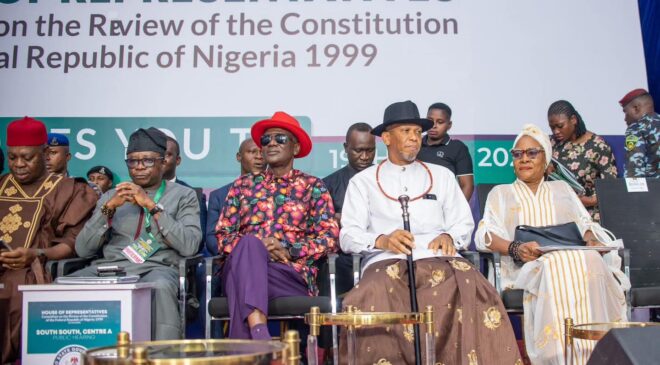
YENAGOA/Nigeria: Senator Ede Dafinone, representing Delta Central Senatorial District, has thrown his weight behind the creation of Ethiope State, declaring it a long-overdue step toward correcting decades of marginalisation, empowering the Urhobo Nation, and unlocking a fresh chapter of economic, social, and cultural advancement in Nigeria.
Speaking at the House of Representatives Committee on Constitutional Review’s public hearing in Yenagoa, Bayelsa State, Senator Dafinone, who serves as Vice Chairman of the Senate Committees on Local Content and Legislative Compliance, argued that the proposed Ethiope State would address entrenched structural imbalances that have left the Urhobo people politically sidelined despite their status as the fifth-largest ethnic nationality in Nigeria.
“The Urhobos have been structurally excluded from Nigeria’s current state configuration. Ethiope State will redress this imbalance, ensure fairer resource allocation, and accelerate infrastructural development,” Dafinone said at the event held at the Chief D.S. Alamieyeseigha Banquet Hall, Government House, Yenagoa.
He explained that the new state would comprise two Urhobo kingdoms in Warri South Local Government Area, the Urhobo communities in Patani Local Government Area, and eight predominantly Urhobo Local Government Areas, thereby establishing a strong demographic and administrative foundation for statehood.
The senator highlighted the economic justification for the state, noting that Urhoboland hosts some of Nigeria’s most productive oil fields yet remains underdeveloped and largely excluded from resource governance.
“Urhoboland is a major oil-producing region, yet the people have limited influence over how these resources are managed or reinvested,” he stated. “Ethiope State would enable greater control over local resources, catalyse economic growth, and promote responsible resource governance in line with the Petroleum Industry Act.”
Dafinone underscored the economic strength of the proposed state, citing its substantial oil and gas reserves, fertile land for large-scale agriculture, coastal access to seaports in Sapele and Warri, rich fisheries and aquaculture potential, solid mineral resources, and expansive commercial timber forests.
He emphasised that the proposal meets all constitutional requirements for state creation, including popular support, a defined territorial base, economic viability, and legislative backing.
“Ethiope State clearly satisfies these thresholds, making it one of the most procedurally viable and legally sound proposals for state creation in contemporary Nigeria,” he noted.
The lawmaker said the proposed state would offer a more coherent administrative structure grounded in shared cultural identity and values, allowing for more effective governance, service delivery, and policy implementation that reflects the specific needs of its people.
“With its state, the Urhobo people would gain the autonomy to chart their developmental priorities, implement localised policies, and take ownership of their governance. This self-determination would foster greater civic participation and accountability,” he added.
Senator Dafinone stated that statehood would empower Ethiope to pursue tailored development agendas across sectors such as education, healthcare, agriculture, and industrialisation. He described the move as a formal recognition of the Urhobo people’s contribution to the Nigerian federation.
He cited existing institutional and industrial infrastructure, such as Delta State University, Abraka; Federal University of Petroleum Resources, Effurun; Petroleum Training Institute, Effurun; Delta State Polytechnic, Otefe-Oghara; Federal Polytechnic, Orogun; and the Delta State College of Physical Education, Mosogar—as assets that would serve as a foundation for Ethiope State’s take-off. Key economic drivers like the Delta Steel Company in Aladja and Warri Refining and Petrochemical Company were also listed as strategic assets.
Senator Dafinone concluded by declaring that Ethiope State is not just a political aspiration but a constitutional and moral imperative.
“The creation of Ethiope State is a call for fairness, efficiency, and inclusion, principles at the core of any functioning federation. It is necessary to correct a historical wrong, promote equity, and give the Urhobo people their rightful place in Nigeria’s federal structure,” he asserted.
